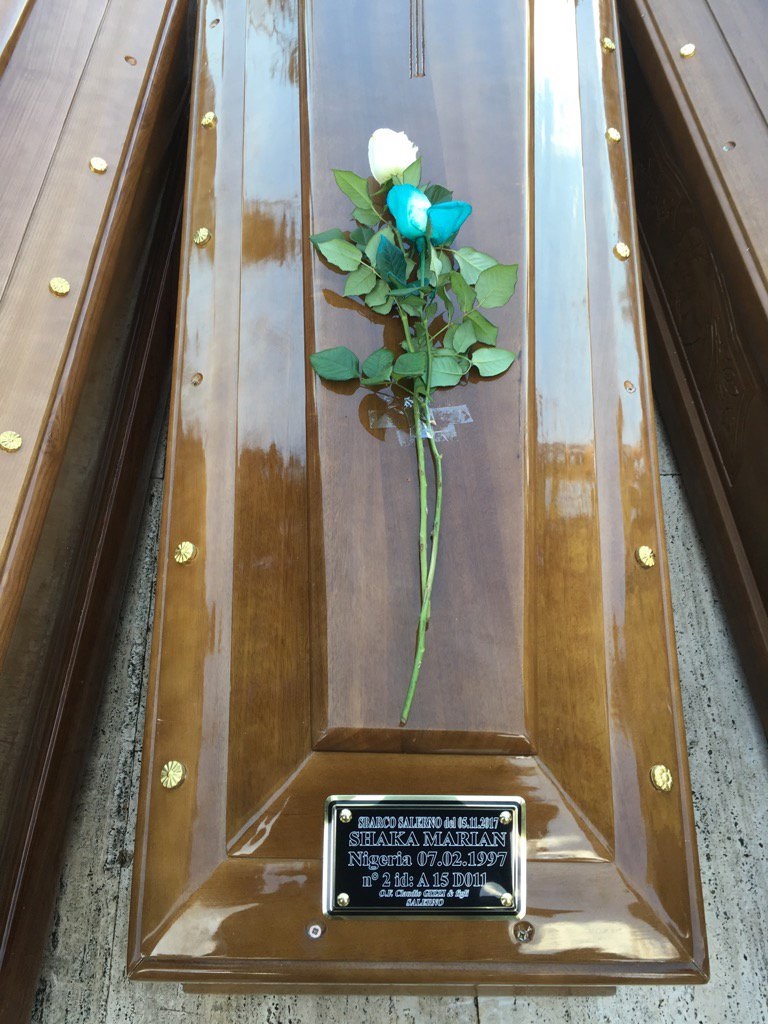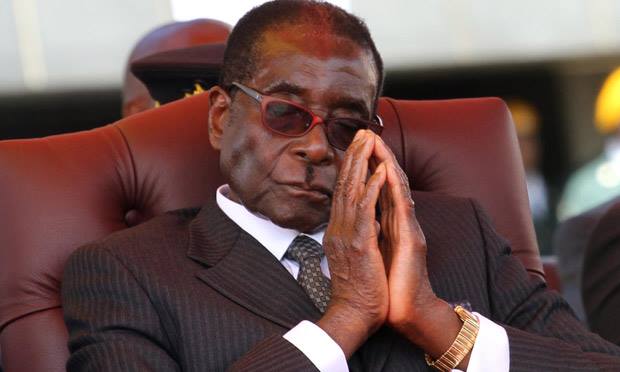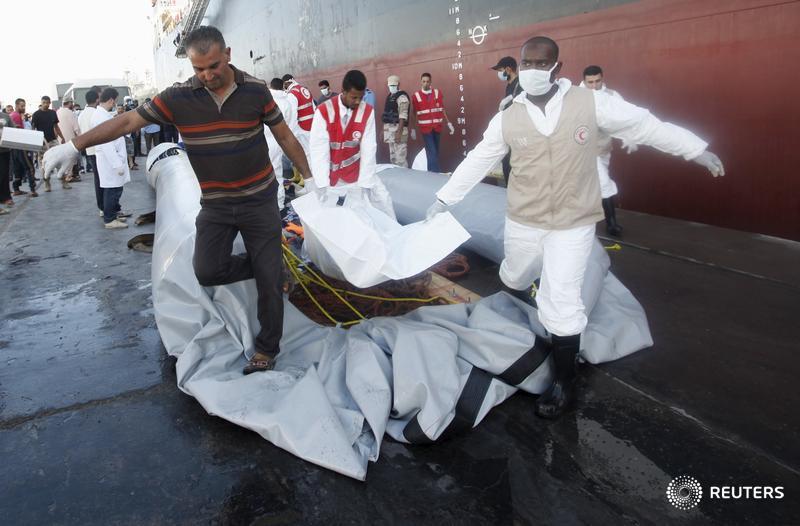BY ANEKWE OBORJI
“When it was evening, there came a rich man of Arimathea, called Joseph, who had himself become a disciple of Jesus. This man went to Pilate and asked for the body of Jesus. Then Pilate ordered it to be handed over. So Joseph took the body, wrapped it in a clean shroud and put it in his own new tomb which he had hewn out of the rock.” (Matthew 27:57-60).
The title of this article is from Whatsapp post I received from a friend after he read the reaction of Nigerian authorities over Italy’s corporal work of mercy of burying the dead extended to those helpless alleged 26 ‘Nigerian girls’ drowned in the Mediterranean Sea some days ago. The 26 ‘Nigerian girls’ were given a solemn Italian state burial by Italian authorities in the City of Salerno, in Southern Italy on November 17, 2017.
The 26 girls were among the latest victims of modern African migration – described by Pope Francis as a new form of slavery taking place in our time today. Strangely, Nigerian authorities have expressed shock over the kind gesture of Italy in burying those 26 girls nine days ahead of the ‘supposed’ date, November 26, 2017.
Since this year, I have published a good number of articles on the theme of modern African migrations as a new form of slavery. In those articles, I highlighted the failure of African states as well as international community, in addressing the root causes of the problem and proffering solutions.
Advertisement
After those previous articles of mine, I felt that writing another article on the topic is not necessary. However, the latest news of the drowning of ’26 Nigerian girls’ in the Mediterranean Sea and the report that Nigeria queries Italy for exercising corporal work of mercy of burying the girls, changed everything for me.
In fact, in spite of the awareness created so far concerning the ugly side of modern African migrations, it appears that nobody is listening or cares to listen. This is why Mediterranean Sea and Sahara Desert have continued to serve as new cemeteries for most of the migrating young Africans. Every day, we hear news of shipwrecks in the Mediterranean Sea of balloon ships conveying migrating young Africans from the coast of Libya to Europe. No African state or the even African Union (AU) has ever cared or bordered to ask of the fate of these migrating young Africans. Not even Nigeria that has the highest number of victims in that regard cares to know about the fate of its own citizens who die daily trying to crossover the Mediterranean Sea through Libya.
The question therefore is, ‘what moral authority has Nigeria to question Italy’s corporal work of mercy of burying the 26 Nigerian girls?’ Among the Western countries, Italy, perhaps, because of its proximity to Libya, appears to be the gateway of these young Africans coming to Europe through the Libyan coast. Though Italy receives financial assistance from European Union (EU) for its emergency aids to the new immigrants arriving through the Sicilian coasts of the Mediterranean Sea, yet it is obvious the country faces more humanitarian challenges of the ‘immigrants’ than any other European country today.
Advertisement
Without pretending to hold brief for Italy on this matter, however, since I write only as a concerned Nigerian, it is my take that Italy, a civilized and responsible state was expecting Nigeria to come immediately it heard the news of the death of those 26 girls in the shores of Italy. Italy might have expected that Nigeria should have been there earlier on the spot to identify who and who among those 26 girls is actually, a Nigerian citizen, decide whether to take them home for burial or allow them to be buried in Italy. Italy might have expected at least this minimum solidarity of Nigeria as a state to its dying (Nigerian) citizens, who happened to be victims of the shipwreck at the Mediterranean Sea. But that seemed not to have happened.
In fact, this is what Italy as a country could have done had it been its own citizens. Italy could have gone there on the spot to be with its citizens dead or alive and bring them back home. This is what any responsible nation state does whenever it receives news that its citizens are killed or trapped in foreign land. There is no doubt, Italy was expecting Nigeria to come immediately the news was broken, identify those girls and if possible request that they should be flown back home for burial in Nigeria. None of these happened.
Nigerian authorities were only waiting to be invited for the burial day in Italy, so that they could send a representative for the ceremony. I believe that this is what Italy could not understand. So, they had to bury the deceased girls as and when they deemed it fit. After all, Italy is footing the bill whether Nigeria is present at the burial ceremony or not.
Italy’s Corporal Work of Mercy Is Commendable
Advertisement
“So Joseph took the body, wrapped it in a clean shroud and put it in his own new tomb which he had hewn out of the rock.” (Matthew 27:59-60).
Italy’s gesture in burying the helpless 26 Nigerian girls in its territory is a ‘corporal work of mercy’ of a concerned foreign nation. Such an act is exemplary and therefore, commendable. Let us briefly, use the biblical story of Joseph of Arimathea to explain this.
The gesture of Joseph of Arimathea, who took exception to the state neglect and high-handedness meted against Jesus, is a good guide to what corporal works of mercy to the dead and the marginalized of the society entail. At the risk of his own security of losing favor with the status quo, Joseph of Arimathea chose to be on the side of the victim of violence and man’s inhumanity to his fellow humans.
Joseph of Arimathea not only provided the beautiful tomb where Jesus’ body was buried after His crucifixion and death on the Cross, but also became a disciple of Jesus. This is the highest witness any individual can give to the Truth about Jesus Christ as the Son of God, made-man for our eternal redemption and salvation.
Advertisement
The gesture of Joseph of Arimathea in giving a befitting burial for Jesus made it possible for all those who had died on earth before Christ-Event to be touched in the tomb by the blood of their Savior for their eternal redemption through the efficacy of the Resurrection. In the tomb provided by Joseph of Arimathea for Jesus’ burial, Jesus touched all our dead ancestors since the creation of the world and made them subjects of the new kingdom inaugurated in Him. In this way, Jesus inaugurated a ‘new kingdom’ through the power of his resurrection from dead and made us citizens of new haven and new earth in the power of the Holy Spirit.
This is the essence of the mystery of the “empty tomb” and the disciples’ witness to the event of the resurrection three days after that burial in the tomb provided for Jesus by Joseph of Arimathea. It is also the essence of giving a befitting burial for the dead.
Advertisement
No society or country worth its salt will ever neglect to honor its dead members with befitting tombs and burial ceremonies. This is very important and very carefully observed especially, when the dead members of the society are victims of violence, war or those who died as result of state neglect and highhandedness. Because the common belief as history teaches is that the souls of victims of violence, especially, state-sponsored violence, will not leave their communities or nation in peace until they are appeased.
The blood of the innocent, victims of violence, state recklessness and impunity, always seek vengeance until justice is done. This belief is common to all cultures and religions of the world, not only among Africans. But for us Africans, it holds a special resonance. This is why, responsible countries of the world have annual commemorations of different kinds to honor members of their society who died as result of violence, e.g., those who died during wars, especially, wars that resulted in genocides or pogroms. It is also for this reason that such countries or state built cenotaphs and epigraphs in honor of such victims of violence and wars in their various cities and communities.
Advertisement
In other words, no right thinking person should quarrel with anybody or country for that matter that decides to extend such corporal work of mercy of giving befitting burial to the dead on its shores. Such a gesture is all the more commendable when it is extended to foreign nationals whose home state are known for neglect of their own citizens experiencing hardship and even violent deaths in various foreign lands and at home as well.
This last point is very important when we consider the fact that honoring the victims of violence is not yet a priority for the Nigerian state. For instance, it is interesting to note that till today, the victims of the Civil War (1967-1970), the Biafran pogroms in particular, have no burial ground dedicated to them or any government approved date for their annual remembrance and honor by the nation. The same applies to the victims of the new waves of Islamic terror groups, those killed recently by Boko Haram and Fulani herdsmen militant terrorists.
Advertisement
This is not to talk of the recent victims of the Nigerian military and police brutalities. This too has resulted in deaths of hundreds of innocent men and women, including children. Yet, Nigerian state has not deemed it necessary to honor any of these innocent victims killed in our soil by either the terrorist groups or the security agents such as the military or police.
The Chibok School Girls debacle is still very fresh in the psyche of international community. The same is true to the ongoing bombing of churches and mosques by extremist Muslim terrorist groups, and the government tacit silence over the activities of the Fulani herdsmen militants terror group, who roam around all over the places with AK47 killing and maiming innocent citizens and destroying their farmlands.
These things are well documented and known to foreign countries like Italy. For most of Western countries, Nigeria as a nation state hasn’t much regard for the lives of its own ordinary citizens who are victims of these terror groups, military brutality, as well as the dehumanization and violent death of migrating Africans in foreign lands.
It is on the basis of this, that one is quick to take an exception from Nigeria’s negative reaction to Italy’s corporal work of mercy to the dead, which it extended to the 26 Nigerian girls drowned in the Mediterranean Sea few weeks ago. After the unfortunate incident of shipwreck believed to have caused the death of the 26 Nigerian girls in the Mediterranean Sea, Italy decided to take the horse by the horn and so gave them a befitting burial in the Italian coastal City of Salerno.
Italian authorities had waited for over a week since the news of the shipwreck that resulted in dead of the 26 Nigerian girls for the Nigerian government to come and show solidarity with their dead citizens, but all to no avail. As if to remind Nigeria once more of its obligation as a state to those 26 Nigerians girls, Italy informed Nigeria about a date for the burial of those girls. When Nigeria did not show any tangible interest and concern, Italy has no choice but to go ahead and bury those girls in a very decent way possible.
Because in the final analysis, Italy knows that its government is going to bear the financial burden of keeping the bodies of those 26 girls in the mortuary, pay for their coffins as well as the burial event itself. That Nigeria is not interested in those things. Nigeria was only happy to have been invited by Italy to come to the burial ceremony day at Salerno on November 26, 2017. Nigeria is not interested in coming earlier than that, when it first heard the news of the plight and death of those 26 Nigerian girls in Italy.
Enduring Lesson for Nigeria
I think that Italy by its action wants to teach Nigeria and indeed African states a lesson. Italy wants to tell us that it is high time we Africans overgrow the ‘slavery and colonial mentality’ of waiting to be told what to do even in a case of death of our own citizens. Italy is telling us by this action to be more responsible as a nation-state and learn to be proactive in responding to the needs of our own citizens. Italy’s action is therefore, not a slight, but a frustration of a foreign country over our inability as an African state to think ahead, reflect on our situations, and cater for the needs of our own citizens when it matters most.
All this implies that the Nigerian state should not be waiting for an invitation from a foreign country before it could act whenever it hears the news of the maltreatment of any of its citizens or the death of Nigerians – victims of modern migrations in foreign land. Nigerian authorities on hearing the news about the killings, deaths or maltreatment of any Nigerian for that matter in any foreign country, should as matter of urgency go to the spot immediately and make the presence of the state felt there. Come to the assistance of Nigerians in need in foreign land.
Recent statistics shows that most of the migrating young Africans traversing the Sahara Desert on foot and crossing Mediterranean Sea in balloon ships to Europe are Nigerians. This means that Nigerian state should as a matter of urgency, do something about it. This is what the action of Italian authorities want to convey to us. As it is now, we are in an emergency-situation of the problem. The Nigerian state should not continue to fold its arm and expect miracle to happen or foreign nations to address this problem for us. The situation will continue to worsen unless something concrete is done and urgently too.
In other words, Italy wants to tell us that Nigerian state should begin to learn to stand for its people. To be always ready to come to the aid and rescue of any Nigerian experiencing desperation or any form of humiliation in foreign land or elsewhere – including those at home, as the case may be.
This is why the state exists and why people can die for their country. It is what makes people patriotic and love their country. When a person knows that his country as a state can stand for and defend him in all circumstances both at home and abroad, such a person is ready to die for his country whenever duty calls. Again, when a citizen knows that even at death his country will never abandon him, but will give him a befitting burial and honor, such a person will never betray his country. At death, the soul of such a person will rest in peace and will never torment the nation or the living in anywhere at all.
It is for this reason also that responsible states or nations always accord a befitting burial for the victims of natural disasters, violence, wars, mishaps (such as victims of the present-day Mediterranean Sea shipwrecks and other Western anti-immigration laws atrocities), etc. They believe that the destiny and future of their state and people depend, to great extent, on how they honor their dead, treat victims of violence, and other vulnerable members of the society.
Responsible states extend this gesture to helpless foreigners who suffer or may happen to die within their territorial shores. They want to watch their hands off the blood of the innocent who died in their land. They don’t want their land to be infested with blood of those foreign nationals killed in a violent way or through neglect and irresponsible actions of their own home states.
Furthermore, this is why responsible states organize befitting funeral or burial ceremonies for such people – foreign nationals, who meet their untimely death in the foreign land or are neglected and abandoned by their own home state governments and people. Again, by giving befitting burial for foreign victims of violence, abandonment and state neglect such as the migrating young Africans in the coast of Western Europe, the host Western country is doing a ritual cleansing of its own land and extending corporal work of mercy to the victims as much as they can.
All these imply that the argument of Nigerian authorities that the burial of the 26 girls by the Italian authorities was sudden and that it took place earlier than scheduled is not enough to discredit the ‘good Samaritan spirit’ and corporal work of mercy Italy extended to those helpless girls who died crossing the Mediterranean Sea. It also means that Nigeria has no moral authority in this regard to question the corporal work of mercy and generous heart Italy extended to those helpless 26 girls. The argument that only three of the 26 girls could be Nigerians is immaterial too. It is only a speculation because Nigeria did not come or send its representative when the incident happened to identify its own citizens. Nigeria had the opportunity to come earlier than scheduled but chose not to do so.
What is important, however, is that there are people who helped to give a befitting burial to those helpless African girls. Simple! Nigeria authorities are invited to learn a lesson (of proactive and quick response to duty) from this particular incident and ensure it does not happen again.
Moreover, Nigeria, having the highest number of victims of modern African migrations must be concerned more than other African countries about the plight of its own citizens residing in foreign lands. As a nation-state, Nigeria is to assure its numerous citizens home and abroad, through state actions and other concrete commitments that they belong to a responsible state that knows its duties and obligations to the citizens, without favor or discrimination. The Nigerian state should not wait for an invitation of foreign country before it could act to save its nationals trapped or killed in foreign land.
A responsible parent who hears about the death of his child in a foreign land, for instance, does not have to wait for an invitation from the foreign country before traveling to the spot to ascertain what has happened to his child. This is what it means to be a responsible father or mother.
The old National Anthem used the metaphor of ‘motherhood’ in reference to the citizen’s patriotic relationship with Nigerian state. The present National Anthem uses the metaphor of ‘fatherhood’ for the same purpose. But as Chinua Achebe says, “Nigeria is neither mother nor father. Nigeria is a child. It could be mother or father tomorrow, but for that to happen, the present generation and government should endeavor to enthrone a responsible leadership that is people-oriented and inclusive.’
This is the crux of the matter. The international poor image the country has today is primarily as result of Nigeria’s failed leadership, which in turn, reflects the way Nigerian state has abandoned its citizens living in or migrating to foreign lands at the mercy of foreign preys. For most of Nigerians living abroad, Nigerian state was never created to protect the interest of its citizens whether at home or abroad. If anything happens to a Nigerian today in the streets of European cities, America, Asia, etc., you can only expect help from good-hearted foreigners or close relatives there and seldom from the Nigerian state.
That means that most Nigerians living abroad see themselves in most cases, as stateless individuals. Moreover, majority of those at home appeared to have lost fate in the whole system. This is why many of our young people preferred to die traversing the Sahara Desert on foot or crossing the Mediterranean Sea with balloon ships than stay in Nigeria under the present dispensation. Talented Nigerians, those great professors, for which Nigerian universities were rated high world over in those days, engineers, architects, archeologist, etc., have out of frustration, migrated to foreign lands. Our young professionals and talented youths in various fields of human endeavor have migrated to either Europe or North America.
Today, young Nigerians of all classes, even those without any skill at all, are leaving the country in large number, risking their lives crossing the Mediterranean Seas under difficult conditions. The question is, ‘where is the state in all these?’
Again, a responsible parent, who sees his children leave the house every evening to watch Television in the house of his neighbor, what will he do? Will he continue to fold his arms and watch his children move around in search of where to watch TV? Certainly, no. A responsible parent in such a situation will not hesitate to do everything possible to provide TV set in his own house for his children to be at home for decent and dignified life.
This is the minimum citizens expect from their government. Find out those things that are forcing our young people to abandon their fatherland and prefer to die in foreign land than stay in Nigeria. Provide them with those basic things of life at home to make Nigeria great again. Addressing such Nigerian reality could be one way of tackling the problem of the present-day migrations of our young people to the countries of Europe, North America and the Asian giants. It is also the most potent weapon towards addressing the ongoing agitations and structural imbalance in the nation’s polity.
Conclusion
It is high time we learn to respect our dead, especially, those killed as result of violence, wars, mishaps, state-sponsored terrorism, highhandedness, recklessness and impunity. Nigerian state is still heavily, infested with blood of the innocent crying out for vengeance and justice. Something needs to be done to appease those victims of violence for spiritual healing and reconciliation in the land. This is an essential part of nation-building.
Our spirituality, whether Christian, Muslim or African Traditional Religion (ATR), teaches us that our dead members are in every way part and parcel of the society. They participate, though mystically, in every affair of the living and society in general. When we deny them justice or good burial, we do so at our own perils.
I know that some who are used to my Pan-African posture and orientation may be wondering of the approach I took in this article. The fact is that it is because of my African commitment and perspective that I have written this article. My desire for my country is to see it live up to our expectations as Africans. As a frontline African nation state, Nigeria has an enormous responsibility to its own citizens and continent as a whole.
Moreover, the problem of modern migrations is a global one. This is because the root causes of modern African migrations may not be divorced entirely from Africa’s colonial past and present-day world’s geopolitical divide and economic policies. That is why Nigeria is not the only country indicted for not doing anything tangible to come to the rescue of its citizens or nationals experiencing dehumanization and all forms of maltreatment in foreign lands since the upsurge of severe anti-immigration laws in the countries of Western Hemisphere.
Apart from the failure of the United Nations and international community in general, in addressing sincerely the challenges of modern migrations, almost all African countries are also culpable of this crime of state negligence of their own people living in foreign lands. In other words, African states must at least, be seen to be doing something to come to the aids of their citizens who are suffering all kinds of dehumanization and untimely death in foreign lands today.
Since most of the victims of modern migrations are young Africans, African nation-states must be concerned more than others in addressing the problem. Nigeria, as the giant of Africa, is to take a lead in this regard.
Oborji is a Catholic priest based in a Rome
Views expressed by contributors are strictly personal and not of TheCable.
Add a comment






